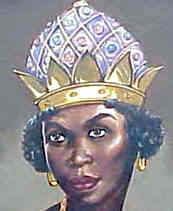 by Yoon Joung Lee From the late 16th century to early 17th century, Europeans were very interested in negotiating about the African slave trade. The Portuguese were especially interested in having slaves for their new colony in Brazil. They were trying to expand their slave-trading activities further south to what is today the region of Congo and Angola, while English and French reached out in northeast Africa. Queen of Angola, Anna Nzinga, was born to King Ngola Kiluanji Kia Samba sometime around 1581 in the kingdom of the Ndongo in southeastern Africa. By the time she was born, the king had accepted limited slave trading with Portuguese. Then, later the Ndongo people, led by her father, began fighting against the Portuguese after their territory was raided for slaves and the Portuguese attempted to conquer territory they believed included silver mines. Her father King Kiluanji was a powerful and oppressive ruler, but he was killed by his own son and Nzinga’s brother, Mbandi, in 1618. Mbandi took the throne for himself and became a king. However, his rule was cruel, unpopular, and chaotic. The kingdom finally broke apart ever since he tried to murder the son of Nzinga to eliminate any threat to his power. While Mbandi was in the capital, Nzinga was in the refuge nearby state of Matamba. Nzinga was known as a great negotiator with her emerging skills. When the Portuguese wanted a meeting with Ndongo in 1622, Mbandi asked her to return to his kingdom and negotiate a treaty with the Portuguese. Thus, she was sent to Portugal as Mbandi’s representative to negotiate with the Portuguese governor. However, the meeting room had only one chair, so Nzinga would have to stand during the meeting. She thought the situation would have made her appear to be the inferior to the Portuguese governor. She had one of her maids kneel to provide her a seat. Facing the governor on the equal level, she was able to convince the Portuguese to accept Ndongo as an independent monarchy, and treaty negotiations were successful. Around this time, she was baptized by the Catholic Church and took the Christian name Dona Anna de Souza. In 1623, she had her brother killed and became ruler. She used religion as a political tool so that her country could possibly open to European missionaries and whatever advanced science and technologies she could attract. By 1626, there was a conflict between her kingdom and Portuguese as she kept pointing to their many treaty violations and found allies in some neighboring peoples including Dutch to continue a resistance campaign against the Portuguese. In the meantime, the Portuguese tried to establish one of her relatives, Phillip, as a puppet king in Ndongo who was more likely to comply with European demands. In 1693, the Portuguese opened peace negotiation with Nzinga after her successful campaign against the Portuguese, but the negotiations failed due to the increasing resistances against the Portuguese. In 1648, the Portuguese arrived and began to succeed. Nzinga was forced to accept Philip as a ruler. In other words, she had to accept the Portuguese actual power in Ndongo. She died in 1663, at the age of 82. Angola did not become independent from Portuguese authority until 1974. However, her rise to power was due to her bravery, intelligence and other personal capabilities that overcame the lamentations of gender. Comments are closed.
|
Archives
July 2017
Categories
All
|
 RSS Feed
RSS Feed